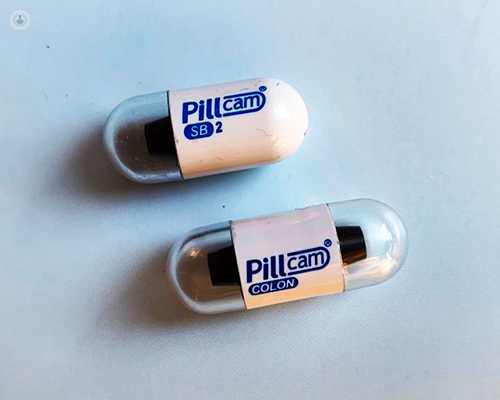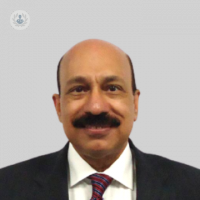Capsule endoscopy: diagnosing digestive disorders
Escrito por:Tummy complaints are a common problem, and often amount to nothing. However, when abdominal pain is persistent or occurs all the time, or when you suffer diarrhoea, constipation, or other bowel problems, it may mean there is something wrong with your digestive system. Sometimes, the best way to get to the bottom of it is to take a look inside. Experienced gastroenterologist Dr Waseem Ashraf is here to explain how capsule endoscopy – a camera inside a pill – can diagnose various problem in the digestive tract.

With the many conditions that can affect the digestive system, it is usually necessary to carry out an endoscopy to identify the culprit. An endoscopy is one of a number of techniques used to examine the inside of the digestive tract. Capsule endoscopy is one type of endoscopy, which uses a miniature camera inside a pill-like device. The patient simply swallows it and it passes through the gastrointestinal (GI) tract, taking images as it goes.
The video capsule, or Pillcam, contains a colour video camera and light source to light the way on its journey through the oesophagus, stomach, small intestine and colon. It takes multiple images every second and transmits them to a recording device that the patient wears on their waist or shoulder. The Pillcam normally passes harmlessly out of the body in the faeces.
The images recorded are then reviewed in a video format by the capsule endoscopy expert, who looks for signs of conditions that may have caused the patients’ symptoms.
What conditions can be diagnosed using capsule endoscopy?
The advantage of capsule endoscopy is that it can capture images from inside the digestive tract itself, giving the doctor a way to visualise the GI tract that cannot be directly visualised by X-rays or other external scans.
Capsule endoscopy can help to reveal the cause of diarrhoea, constipation, abdominal pain and iron deficiency and may be recommended in patients showing these symptoms, especially if other tests and other types of endoscopy have not revealed the cause.
A number of conditions and symptoms may be diagnosed or evaluated using this technique, including:
- Anaemia
- Gastrointestinal bleeding
- Crohn’s disease (a type of inflammatory bowel disease)
- Ulcerative colitis (a type of inflammatory bowel disease)
- Coeliac disease
- Polyps
- Malabsorption
- Various cancers of the GI tract (e.g. oesophagus, stomach, colon, etc)
- Unexplained abdominal pains and diarrhoea
Capsule endoscopy is also useful for monitoring these conditions while they are being treated, to ensure that the treatment is working.
If images are taken by the capsule that show signs of a problem, further tests may be needed to confirm the diagnosis. This may involve a conventional or deep endoscopy (inserting a tube with a camera from one or the other end of the GI tract) and taking biopsies and applying treatments if necessary.
If you are concerned that you may have a problem with your digestive tract and wish to see a gastroenterologist, visit Dr Ashraf's Top Doctors profile.


